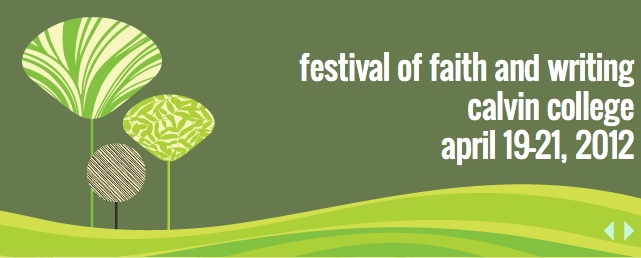I report to you late on Friday night after two exhilarating days at the Festival of Faith and Writing at Calvin College. I’m exhausted and happy and there’s still a whole day to go. You know how it is at these sorts of things—you gulp and gulp and there’s not a minute to digest, really, until it’s all over. But I’ll share a quick jotting from amid the swirl of color and light that is Festival.
Why am I doing this? Writers ask themselves that question over and over, and it’s good to get together with other writers once in a while and assure each other that this ridiculous scribbling we do is a worthy human endeavor. Maybe even an important one. Maybe even … necessary? We all have days, after all, when we would like to push the laptop aside for good and take up something with immediate and tangible results, like plumbing or accountancy.
But then there’s Gary Schmidt, assuring us all that story matters. And friends reading ravishing poems aloud, and people listening to the rhythms of voice and the loveliness of words. And fans, in their gracious way, pulling authors aside to say, “Your book [the one you thought had long disappeared from all human consciousness] meant something huge to me, and still does.” And college graduates admitting that, while having a paycheck is nice, they miss the intoxicating days when all they did was read books about the deepest stuff of life, and talk with other like-minded people about the deepest stuff of life.
And John Leax and Maurice Manning, thinking aloud about Genesis and noticing that naming things matters, that God gave us that task, and that naming things creates reality, for good or ill, and it’s important to do it well.
And Marilynne Robinson asking why on earth we seem to be conceding to a “normalization of fear” in our civilization, and why on earth writers of faith would be afraid to claim “what is essential” to them in their writing. And urging that if Christians really believe that the perfect love of God casts out fear, then Christian writers might possibly convey the “serenity of deeply convinced Christian people.”
And the essayist Brian Doyle declaring that, as ephemeral and haphazard as writing often seems, it’s a task some of us seem to be required to do, and we can be content with that: “I am a storycatcher,” he writes in a recent essay, “charged with finding stories that matter, stories about who we are at our best, who we might be still, because without stories we are only mammals with weapons. I am here to point at shards of holiness. That’s all. That’s enough.”
After all that, I am ready to claim the final words of a haunting choral work by Eriks Esenvalds, performed today with flawless satin beauty by the Calvin Capella Choir:
My work is nothing but a drop in the ocean,
But if I did not put that drop, the ocean
would be one drop the less.





